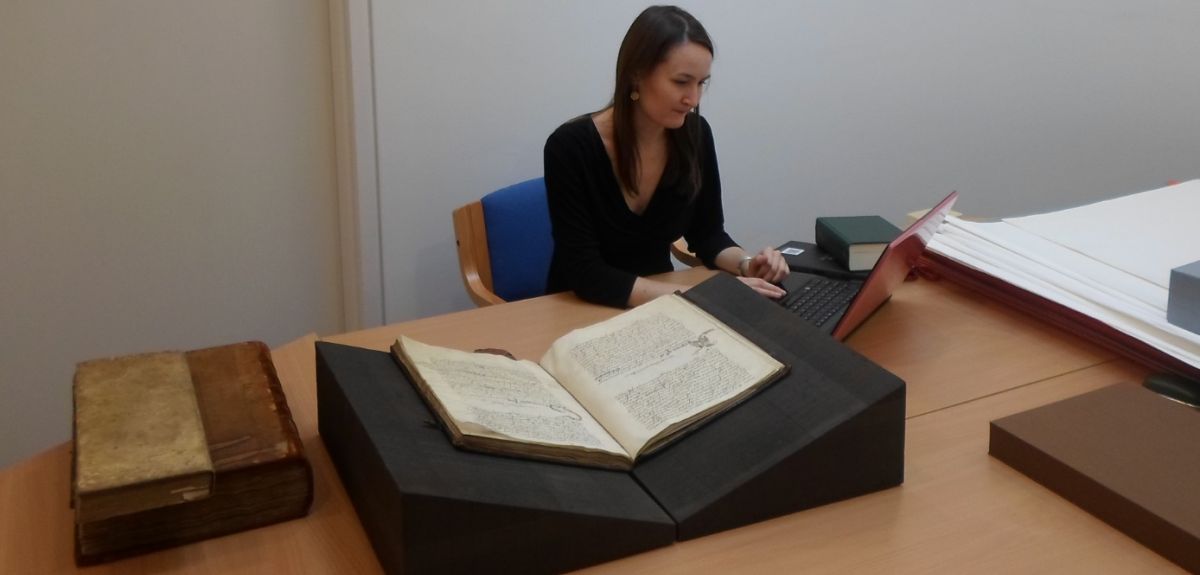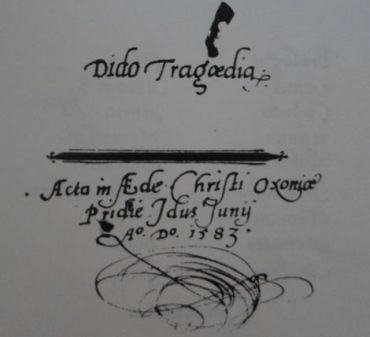
A night of Dido, drama, and dinner with a difference
The clocks will be turned back 430 years at Christ Church on Saturday.
A little-known but fascinating Elizabethan play, rustled up to entertain the Polish ambassador Albert Łaski on his visit to Oxford in 1583, was the inspiration for this weekend's special event.
The evening of drama, served up alongside a banquet in Christ Church hall, is being organised by the University's Early Drama at Oxford (EDOX) project, run by a team of scholars and specialist film-makers.
Central to the sold-out event will be the performance of William Gager's Dido, translated from its original Latin by classicist and English scholar Elizabeth Sandis. The play will be staged in its original venue – once again in front of a representative of the Polish embassy, the Deputy Head of Mission, Dariusz Łaska.
Gager, who was a law student at Christ Church at the time, will be competing for top billing with Christopher Marlowe, whose Dido, Queen of Carthage will also be staged on the night.
 Elizabeth Sandis: "We're trying to give people a chance to get to know dramatic material, some of it in Latin, that they may be unfamiliar with or find intimidating"
Elizabeth Sandis: "We're trying to give people a chance to get to know dramatic material, some of it in Latin, that they may be unfamiliar with or find intimidating"And the 16th-century feel will be completed by an authentic Elizabethan banquet, featuring such contemporary delicacies as vegetable and herb soup, roast pork belly with cinnamon gravy, spiced orange and wine jelly, and frumenty, a wheat-based 'porridge' traditionally served with venison or porpoise.
Elizabeth Sandis (pictured above), a DPhil candidate at Merton College specialising in the academic drama of Christ Church and St John’s College in 17th-century Oxford, said: 'We're trying to give people a chance to get to know dramatic material, some of it in Latin, that they may be unfamiliar with or find intimidating. The Christ Church event is the second in our series, after Magdalen last year, and next year we are thinking about a similar event at Merton.
'William Gager got really involved in the drama scene at Christ Church in the 1580s, so when the Polish ambassador was visiting at short notice and they needed to entertain and impress him, Gager was the person they turned to.'
The result was Dido, an adaptation of Virgil's epic Aeneid in the original Latin.
Elizabeth said: 'I've injected a few of the Latin verses back into my translation to give people the chance to hear how it would have sounded in 1583 – iambic senarii and lyric metres, and the Virgilian vocabulary.
'Gager was able to take entire sections of Virgil and incorporate them into his work. It was Elizabethan-style plagiarism but of a wholly acceptable kind because he was able to show off his skills as a Latinist and transpose Virgil's canonical lexicon into something new.
'At the time, everyone would have been familiar with the story of Dido and the fall of Troy, so it was a challenge for the playwright to dramatise that and do something clever with it.'
One example of Gager's playfulness involves a scene in which Aeneas's son, Ascanius, is brooding on the collapse of his home at Troy, having heard his father’s tale of the city’s fall the previous evening at dinner.
Elizabeth said: 'Dido asks him what the matter is, and he replies that he is thinking about his father's story from the night before and is beginning to imagine Troy in the features of a giant pudding on the banquet table – for example, the river Simoeis and the place where the wooden horse was brought in.
'It would have been a large marzipan dessert, and we’ll be recreating it on the night.'
The authentic Elizabethan menu to be enjoyed by the 240 guests was created by Christ Church head chef Chris Simms.
Gager's Dido will form part of a double bill on Saturday, sharing the stage with Marlowe’s Dido, Queen of Carthage. Both will be performed by all-male casts, just as they would have been in the late 16th century. Attendees will be able to compare and contrast the two adaptations ahead of a conference, titled 'Performing Dido', to be held by EDOX the following day.
EDOX was formed around 18 months ago by Elizabeth Sandis, Dr James McBain and Professor Elisabeth Dutton, who is directing Dido. The project, partly funded by the British Academy, is undertaking a systematic study of plays written and/or performed in the Oxford colleges between 1480 and 1650.